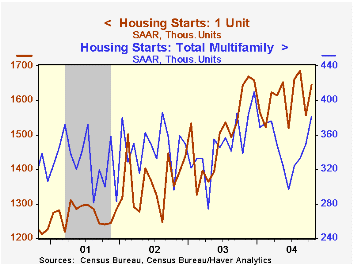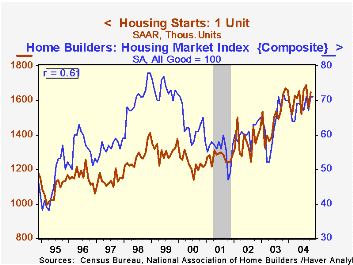 Global| Nov 17 2004
Global| Nov 17 2004Housing Starts Stronger Than Expected
by:Tom Moeller
|in:Economy in Brief
Summary
In October, housing starts rose 6.4% to 2.027M, the highest level of the year.Consensus expectations had been for 1.96M starts. Single-family starts recouped nearly all of the prior month's decline with a 5.7% gain. Year to date [...]

In October, housing starts rose 6.4% to 2.027M, the highest level of the year.Consensus expectations had been for 1.96M starts.
Single-family starts recouped nearly all of the prior month's decline with a 5.7% gain. Year to date single family starts averaged 1.605M, up 6.6% from last year's full year average. Multi-family starts rose 9.5% and the year to date average equals last year.
Building permits fell 0.7% m/m to 1.984M. 
The Composite Housing Market Index from the National Association of Home Builders (NAHB) was stable in November t the downwardly revised October level of 71.
The NAHB index is a diffusion index based on a survey of builders. Readings above 50 signal that more builders view conditions as good than poor.
The index of current single family home sales also surged to its highest in a year and the index of expected sales in six months jumped the highest level since 1999.
During the last ten years there has been a 60% correlation between the level of single family housing starts and the NAHB Index.
| Housing Starts (000s, AR) | Oct | Sept | Y/Y | 2003 | 2002 | 2001 |
|---|---|---|---|---|---|---|
| Total | 2,027 | 1,905 | 2.2% | 1,8 53 | 1,7 10 | 1,601 |
| Single-family | 1,645 | 1,556 | 0.1% | 1,505 | 1,3 63 | 1,272 |
| Multi-family | 3 82 | 349 | 12.7% | 348 | 347 | 330 |
| Building Permits | 1,984 | 1 ,998 | -1.5% | 1,8 89 | 1,749 | 1,637 |
| Nat'l Association of Home Builders | Nov | Oct | Nov '03 | 2003 | 2002 | 2001 |
| Composite Housing Market Index | 7 1 | 71 | 7 0 | 64 | 61 | 56 |
Tom Moeller
AuthorMore in Author Profile »Prior to joining Haver Analytics in 2000, Mr. Moeller worked as the Economist at Chancellor Capital Management from 1985 to 1999. There, he developed comprehensive economic forecasts and interpreted economic data for equity and fixed income portfolio managers. Also at Chancellor, Mr. Moeller worked as an equity analyst and was responsible for researching and rating companies in the economically sensitive automobile and housing industries for investment in Chancellor’s equity portfolio. Prior to joining Chancellor, Mr. Moeller was an Economist at Citibank from 1979 to 1984. He also analyzed pricing behavior in the metals industry for the Council on Wage and Price Stability in Washington, D.C. In 1999, Mr. Moeller received the award for most accurate forecast from the Forecasters' Club of New York. From 1990 to 1992 he was President of the New York Association for Business Economists. Mr. Moeller earned an M.B.A. in Finance from Fordham University, where he graduated in 1987. He holds a Bachelor of Arts in Economics from George Washington University.






